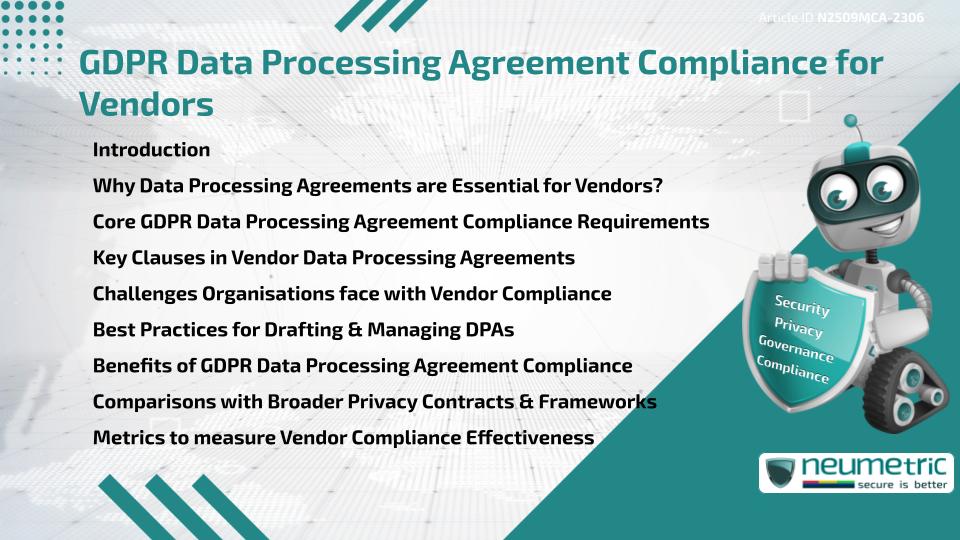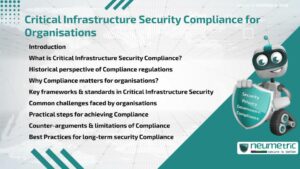Table of Contents
ToggleIntroduction
GDPR Data Processing Agreement Compliance is a cornerstone of Vendor Management for Organisations subject to the General Data Protection Regulation [GDPR]. A Data Processing Agreement [DPA] is a legally binding Contract between Data Controllers & Data Processors that outlines how Personal Data will be managed, protected & processed. For Businesses, ensuring that Vendors comply with DPA requirements reduces Risks, demonstrates Accountability & strengthens Regulatory readiness.
Why Data Processing Agreements are Essential for Vendors?
Vendors often act as Processors by handling Payroll Services, Cloud storage, IT support or Marketing Platforms. GDPR requires that every Controller-Processor relationship be governed by a written Contract to ensure Lawful & secure Data Handling. Without GDPR Data Processing Agreement Compliance, both Organisations & Vendors Risk severe penalties, Data Breaches & Reputational harm. Official guidance can be found at the European Commission GDPR site.
Core GDPR Data Processing Agreement Compliance Requirements
A GDPR Data Processing Agreement Compliance Framework must include:
- Scope of Processing: Clear description of the type of Data & purpose of Processing.
- Confidentiality Obligations: Processors must ensure Staff maintain Confidentiality.
- Security Measures: Technical & Organisational safeguards such as Encryption & Access Controls.
- Sub-processor Rules: Approval processes for engaging additional third parties.
- Data Subject Rights: Mechanisms to assist Controllers in fulfilling Rights like access, rectification or erasure.
- Audit & Oversight: Provisions for Controllers to Audit Vendors’ Compliance.
- Breach Notification: Timely reporting obligations for Data Breachees.
Key Clauses in Vendor Data Processing Agreements
Some of the most critical clauses in DPAs include:
- Data Retention & Deletion Policies: Vendors must delete or return Personal Data at Contract end.
- Liability & Indemnity: Defining Responsibility for damages caused by Non-Compliance.
- International Transfers: Ensuring transfers outside the EU comply with GDPR Safeguards.
- Compliance with Instructions: Vendors must only act on documented instructions from Controllers.
These clauses ensure Clarity, Accountability & Legal protection.
Challenges Organisations face with Vendor Compliance
Enterprises often encounter challenges such as:
- Tracking Compliance across multiple Vendors with different Contracts
- Vendors resisting Audits or additional Obligations
- Managing Sub-processors in complex Supply Chains
- Aligning DPAs with evolving Regulations & Business needs
These challenges highlight the importance of structured Contract Management Processes.
Best Practices for Drafting & Managing DPAs
To achieve GDPR Data Processing Agreement Compliance, Organisations should:
- Use Standard Templates aligned with GDPR Article 28 requirements
- Maintain a Vendor register with all active DPAs
- Review Contracts regularly to reflect Regulatory or Business changes
- Conduct periodic Audits of Vendor practices
- Provide training for Procurement & Legal Teams on GDPR obligations
Practical frameworks for implementation can be found at ISACA.
Benefits of GDPR Data Processing Agreement Compliance
Organisations that enforce GDPR Data Processing Agreement Compliance benefit from:
- Reduced Risk of Regulatory Fines & Penalties
- Stronger control over Vendor Data Handling practices
- Improved Trust with Customers & Business Partners
- Enhanced Accountability & Governance readiness
- More resilient & transparent Vendor Relationships
Comparisons with Broader Privacy Contracts & Frameworks
Unlike general Contracts, DPAs are specifically mandated under GDPR for Controller-Processor Relationships. Other frameworks like ISO 27001 or HIPAA require Vendor Security Agreements, but GDPR is unique in its detailed Article 28 requirements.
Metrics to measure Vendor Compliance Effectiveness
Key indicators include:
- Percentage of Vendors with signed & updated DPAs
- Frequency of Vendor Audits conducted successfully
- Number of Breaches or Compliance violations reported by Vendors
- Alignment of Vendor practices with Controller instructions
- Regulator or Auditor feedback on Vendor Management practices
Takeaways
- Ensures all Vendor Relationships comply with GDPR Article 28 requirements
- DeFines clear Roles, Responsibilities & Safeguards for Personal Data handling
- Strengthens Accountability & Transparency in Vendor Contracts
- Reduces Risks of Breaches, Fines & Reputational damage
- Supports Regulator & Auditor trust through documented Agreements
- Improves Governance of complex Vendor & Sub-processor chains
- Enhances long-term resilience in Global Vendor Relationships
FAQ
What is GDPR Data Processing Agreement Compliance?
It is the process of ensuring all Vendor Contracts involving Personal Data meet GDPR requirements.
Who needs a Data Processing Agreement?
Any Controller working with a Processor (Vendor or Service Provider) handling Personal Data must have a DPA.
What must a DPA include?
It must cover Scope, Security, Sub-Processors, Data Subject Rights, Audit provisions & Breach notification rules.
Are Standard Contract Templates available?
Yes, many Organisations use Standard GDPR-aligned DPA Templates as a baseline.
Can a Vendor refuse to sign a DPA?
No, under GDPR, a Vendor cannot legally process Data without a valid DPA.
How often should DPAs be reviewed?
They should be reviewed annually or whenever Regulations, Vendors or Business processes change.
Do DPAs apply to Non-EU Vendors?
Yes, any Vendor Processing EU Residents’ Data must comply with GDPR DPA obligations, regardless of location.
Need help for Security, Privacy, Governance & VAPT?
Neumetric provides organisations the necessary help to achieve their Cybersecurity, Compliance, Governance, Privacy, Certifications & Pentesting needs.
Organisations & Businesses, specifically those which provide SaaS & AI Solutions in the Fintech, BFSI & other regulated sectors, usually need a Cybersecurity Partner for meeting & maintaining the ongoing Security & Privacy needs & requirements of their Enterprise Clients & Privacy conscious Customers.
SOC 2, ISO 27001, ISO 42001, NIST, HIPAA, HECVAT, EU GDPR are some of the Frameworks that are served by Fusion – a SaaS, multimodular, multitenant, centralised, automated, Cybersecurity & Compliance Management system.
Neumetric also provides Expert Services for technical security which covers VAPT for Web Applications, APIs, iOS & Android Mobile Apps, Security Testing for AWS & other Cloud Environments & Cloud Infrastructure & other similar scopes.
Reach out to us by Email or filling out the Contact Form…





